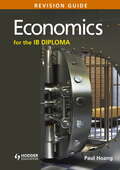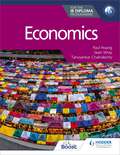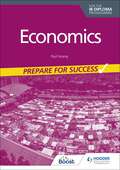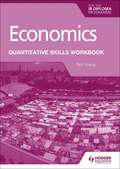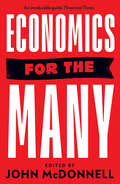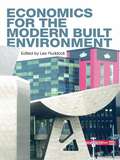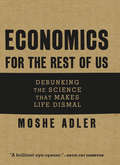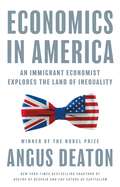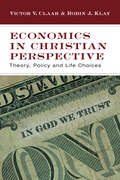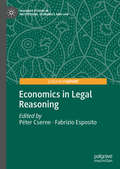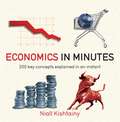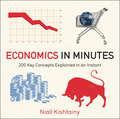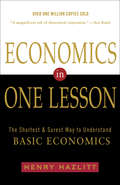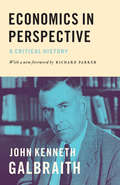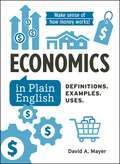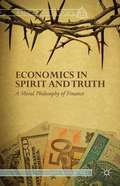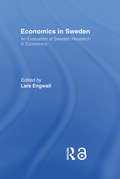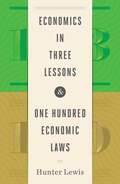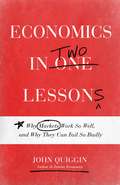- Table View
- List View
Economics for the IB Diploma Revision Guide: (International Baccalaureate Diploma)
by Paul HoangEconomics for the IB Diploma Revision Guide will ensure students can aim for their best grade with the help of accurate and accessible notes, examiner advice, and exam-style questions on each key topic. - Builds revision skills through a range of strategies and detailed examiner advice - Covers all the knowledge with concise, clear explanations of all the syllabus requirements and topics - Demonstrates what is required to get the best grades with tips, sample questions and model answers Answers are free online at www.hodderplus.com
Economics for the IB Diploma Revision Guide: (International Baccalaureate Diploma)
by Paul HoangEnsure students can aim for their best grade with the help of accurate and accessible notes, expert advice, and exam-style questions on each key topic.- Builds revision skills through a range of strategies and detailed expert advice- Covers all the knowledge with concise, clear explanations of all the syllabus requirements and topics- Demonstrates what is required to get the best grades with tips, sample questions and model answersAnswers are free online at www.hoddereducation.com/IBextras
Economics for the IB Diploma: (international Baccalaureate Diploma) (Skills For Success Ser.)
by Paul HoangDeveloped in cooperation with the International Baccalaureate®Ensure full coverage of the new syllabus with this comprehensive guide written by highly experienced authors, that explores all topics through inquiry, concepts, content and contexts and their interrelationships with each other.- Explore economics through the nine key concepts in the new course with our newly developed acronym for a deeper and more integrated understanding of the subject.- Includes new integrated subtopics of Economics of the environment and Economics of inequality and poverty which helps bring to light the global challenges facing the planet today and how these can be addressed using an Economics lens.- Apply new skills and knowledge to everyday life with examples and case studies.- Foster the attributes of the lB learner profile with explicit reference made throughout, as well as TOK links for every topic.- Prepare for the new assessment model with exam-style questions and review questions.- Avoid common mistakes and aim for the best grades with expert tips and hints.
Economics for the IB Diploma: (international Baccalaureate Diploma) (Skills For Success Ser.)
by Paul HoangDeveloped in cooperation with the International Baccalaureate®Ensure full coverage of the new syllabus with this comprehensive guide written by highly experienced authors, that explores all topics through inquiry, concepts, content and contexts and their interrelationships with each other.- Explore economics through the nine key concepts in the new course with our newly developed acronym for a deeper and more integrated understanding of the subject.- Includes new integrated subtopics of Economics of the environment and Economics of inequality and poverty which helps bring to light the global challenges facing the planet today and how these can be addressed using an Economics lens.- Apply new skills and knowledge to everyday life with examples and case studies.- Foster the attributes of the lB learner profile with explicit reference made throughout, as well as TOK links for every topic.- Prepare for the new assessment model with exam-style questions and review questions.- Avoid common mistakes and aim for the best grades with expert tips and hints.
Economics for the IB Diploma: Prepare for Success
by Paul HoangSupport your students to achieve their best grade with the ultimate course companion; providing clear and concise explanations of all new framework requirements and topics, with exam practice questions to strengthen and develop learning.- Build confidence and reinforce skills with guidance on how to include key concept, content and context connections into exam answers.- Practise and revise effectively from a range of strategies and a variety of high-achieving example answers.- Achieve the best grades through advice given from a highly experienced author on how to approach and explore a topic through inquiry, including additional top tips and common mistakes.- Focus revision by using key terms with definitions listed for each of the nine key concepts of the new course.- Answers are available to download for free: www.hoddereducation.co.uk/ib-extras
Economics for the IB Diploma: Quantitative Skills Workbook
by Paul HoangReinforce and improve your students' quantitative skills with this write-in workbook, which includes exam-style practice questions. · Prepare for the new assessment model with exam-style questions that are broken down to help students understand the question as a whole and the way they will need to tackle it.· Questions are presented in the chronological order of the syllabus, to aid knowledge and understanding of the new course (first exams 2022).· Provides lots of opportunities to practice quantitative skills, techniques and methods with exam-style questions.· Detailed mark schemes are provided to support students' assessment success, from a highly experienced author, IB workshop leader and teacher.· Answers available to download for free: www.hoddereducation.co.uk/ib-extras
Economics for the Many
by John McDonnellOur economy is rigged in favour of a wealthy elite. We need a new approach: an economics for the many.Big challenges lie ahead for our society: the rise of automation and the threat of catastrophic climate change. But so, too, do the huge possibilities presented by new technology and better ways of organising our economy in the wake of neoliberalism’s failure. With the election of Jeremy Corbyn as Labour leader, and the extraordinary turnaround in Labour’s fortunes in the 2017 election, we have a real opportunity to build an economy in Britain that is radically fairer, radically more democratic, and radically more sustainable. But we need the right ideas and strategies if we’re going to get there.Economics for the Many, edited and with an introduction by Shadow Chancellor of the Exchequer John McDonnell, features contributions from the participants in his New Economics conferences, including Barry Gardiner, Ann Pettifor, Prem Sikka, and Guy Standing. It covers topics from housing, public ownership, and fairer international trading systems to industrial policy for the twenty-first century and how to tackle tax avoidance and regional imbalances. Together, the essays in this volume lay out a vision for a new economics, one that works for the many, not the few.
Economics for the Modern Built Environment
by Les RuddockRecent decades have seen a major social and economic changes across the developed world and consequent changes in the construction and property industries. The discipline of construction economics needs to respond to this. For instance, the importance of sustainable development has become recognised, as has the need to increasingly master the medium and long-term consequences of construction, not only in the production but also in the management of buildings across their whole life-cycle. And the new focus on the service rendered by buildings, as distinct from the buildings themselves, has prompted a new approach to the construction and property industries. Any economic analysis of these sectors has to take account of all the participants involved in the life-cycle of building structures – not only in the design and construction, but also in the operation, maintenance, refurbishment and demolition of property. This innovative new book draws on the work of the Task Group of the CIB (International Council for Research and Innovation) on Macroeconomics for Construction. It pulls together discussions of mesoeconomic and macroeconomic models and methodologies in construction economics and presents an exciting approach to the analysis of the operation and function of the construction and property sector within the economy. Graduate students and researchers will find it an invaluable work.
Economics for the Rest of Us: Debunking the Science that Makes Life Dismal
by Moshe Adler&“Vivid case studies . . . Adler&’s frustration with wrongheaded economic thinking is as entertaining as it is thought provoking.&” —Publishers Weekly Why do so many contemporary economists consider food subsidies in starving countries, rent control in rich cities, and health insurance everywhere &“inefficient&”? Why do they feel that corporate executives deserve no less than their multimillion-dollar &“compensation&” packages and workers no more than their meager wages? Here is a lively and accessible debunking of the two elements that make economics the &“science&” of the rich: the definition of what is efficient and the theory of how wages are determined. The first is used to justify the cruelest policies, the second grand larceny. Filled with lively examples—from food riots in Indonesia to eminent domain in Connecticut and everyone from Adam Smith to Jeremy Bentham to Larry Summers—Economics for the Rest of Us shows how today&’s dominant economic theories evolved, how they explicitly favor the rich over the poor, and why they&’re not the only or best options. Written for anyone with an interest in understanding contemporary economic thinking—and why it is dead wrong—Economics for the Rest of Us offers a foundation for a fundamentally more just economic system. &“Brilliant.&” —David Cay Johnston, Pulitzer Prize–winning and New York Times–bestselling author of It&’s Even Worse Than You Think
Economics in Action
by V. SanthakumarThis book is a compendium on economics specially designed for development practitioners and civil-society activists who do not have formal training in the subject. It provides an understanding of microeconomics, knowledge of the macroeconomic environment and insights from the specialized area called development economics. Through separate chapters, it covers poverty, inequality, social and gender discrimination, and environmental impact. Economics in Action provides the necessary knowledge to participants of public debates who do not have a background in economics and would like to reinforce their arguments and analyses with sound economic theory. It also carries specific tips on using economics in development practice and interventions. The author, in general, tries to relate the ideas and relationships described in economics with the real-world problems that we may encounter as part of our lives.
Economics in America: An Immigrant Economist Explores the Land of Inequality
by Angus DeatonFrom the Nobel Prize–winning economist and New York Times bestselling coauthor of Deaths of Despair and the Future of Capitalism, candid reflections on the economist&’s craftWhen economist Angus Deaton immigrated to the United States from Britain in the early 1980s, he was awed by America&’s strengths and shocked by the extraordinary gaps he witnessed between people. Economics in America explains in clear terms how the field of economics addresses the most pressing issues of our time—from poverty, retirement, and the minimum wage to the ravages of the nation&’s uniquely disastrous health care system—and narrates Deaton&’s account of his experiences as a naturalized US citizen and academic economist.Deaton is witty and pulls no punches. In this incisive, candid, and funny book, he describes the everyday lives of working economists, recounting the triumphs as well as the disasters, and tells the inside story of the Nobel Prize in economics and the journey that led him to Stockholm to receive one. He discusses the ongoing tensions between economics and politics—and the extent to which economics has any content beyond the political prejudices of economists—and reflects on whether economists bear at least some responsibility for the growing despair and rising populism in America.Blending rare personal insights with illuminating perspectives on the social challenges that confront us today, Deaton offers a disarmingly frank critique of his own profession while shining a light on his adopted country&’s policy accomplishments and failures.
Economics in Christian Perspective: Theory, Policy and Life Choices
by Victor V. Claar Robin J. KlayUnemployment. Environmental damage. Poverty. Economists Victor Claar and Robin Klay critically engage mainstream economic theory and policy recommendations to provide guidance for faithfully and responsibly addressing these and other important economic issues. Affirming that a just and prosperous society depends for its continued success on maintaining the right balance of power among three principal spheres--democratic governments, market-organized economies, and strong moral and cultural institutions--Claar and Klay demonstrate how Christian principles and values guide and undergird a flourishing and just economy. This text is for use in any course needing a survey of the principles of economics.
Economics in Legal Reasoning (Palgrave Studies in Institutions, Economics and Law)
by Péter Cserne Fabrizio EspositoThis Palgrave Pivot is the first book in the field of Law & Economics looking at the relationship between economics and law in legal reasoning. The book constitutes a reference point for the economic analysis of legal institutions, as legal reasoning remains the dimension of legal systems least explored by economists.Despite their differences, economics and legal reasoning interact in many interesting ways. This book offers a fast track to these interactions. Both supporters and critics of Law & Economics will be exposed to a yet-to-be developed area of interaction between the disciplines.This book will be of interest to economists, legal scholars, and Law and Economics specialists, and can be used as teaching material in courses on Law & Economics and legal reasoning as well.
Economics in Minutes
by Niall KishtainyEconomics in Minutes condenses key economics concepts into 200 short and easily digested essays. Featuring not only fundamental ideas, such as the role of money and how the stock market works, but also subjects that are increasingly important to us today - unemployment, government debt and corporate tax avoidance, for example. Economics in Minutes is the ideal introduction to a complex and vital subject.Key topics are succinctly described and accompanied by illustrations, making them simple to read and easy to remember. This convenient little reference guide will allow readers to understand the theories underpinning a subject that affects our lives on a daily basis.Chapters include: Supply and demand, globalization, market failure, GDP and happiness, risk and uncertainty, living standards and productivity, Game theory, economics and culture.
Economics in Minutes
by Niall KishtainyEconomics in Minutes condenses key economics concepts into 200 short and easily digested essays. Featuring not only fundamental ideas, such as the role of money and how the stock market works, but also subjects that are increasingly important to us today - unemployment, government debt and corporate tax avoidance, for example - it is the ideal introduction to a complex contemporary field. Key topics are succinctly described and accompanied by illustrations, making them simple to read and easy to remember. This convenient little reference guide will allow readers to understand the theories underpinning a subject that affects our lives on a daily basis. Chapters include: Supply and demand, Globalization, Market failure, GDP and happiness, Risk and uncertainty, Living standards and productivity, Game theory, Economics and culture.
Economics in Minutes (IN MINUTES)
by Niall KishtainyEconomics in Minutes condenses key economics concepts into 200 short and easily digested essays. Featuring not only fundamental ideas, such as the role of money and how the stock market works, but also subjects that are increasingly important to us today - unemployment, government debt and corporate tax avoidance, for example - it is the ideal introduction to a complex contemporary field. Key topics are succinctly described and accompanied by illustrations, making them simple to read and easy to remember. This convenient little reference guide will allow readers to understand the theories underpinning a subject that affects our lives on a daily basis. Chapters include: Supply and demand, Globalization, Market failure, GDP and happiness, Risk and uncertainty, Living standards and productivity, Game theory, Economics and culture.
Economics in One Lesson: The Shortest and Surest Way to Understand Basic Economics
by Henry HazlittA million copy seller, Henry Hazlitt's Economics in One Lesson is a classic economic primer. But it is also much more, having become a fundamental influence on modern "libertarian" economics of the type espoused by Ron Paul and others.Considered among the leading economic thinkers of the "Austrian School," which includes Carl Menger, Ludwig von Mises, Friedrich (F.A.) Hayek, and others, Henry Hazlitt (1894-1993), was a libertarian philosopher, an economist, and a journalist. He was the founding vice-president of the Foundation for Economic Education and an early editor of The Freeman magazine, an influential libertarian publication. Hazlitt wrote Economics in One Lesson, his seminal work, in 1946. Concise and instructive, it is also deceptively prescient and far-reaching in its efforts to dissemble economic fallacies that are so prevalent they have almost become a new orthodoxy.Many current economic commentators across the political spectrum have credited Hazlitt with foreseeing the collapse of the global economy which occurred more than 50 years after the initial publication of Economics in One Lesson. Hazlitt's focus on non-governmental solutions, strong -- and strongly reasoned -- anti-deficit position, and general emphasis on free markets, economic liberty of individuals, and the dangers of government intervention make Economics in One Lesson, every bit as relevant and valuable today as it has been since publication.From the Trade Paperback edition.
Economics in Our Times (Revised Edition)
by Roger A. ArnoldEconomics in Our Times presents a comprehensive exciting relevant and fully integrated economics program for today's high-school student. Five themes recur throughout the Economics in Our Times Program: 1) Economics play a large part in local state national and world events and it is important for the well-educated student to understand this. 2) Economics consists not just of a list of topics (e.g. inflation unemployment monetary and fiscal policy etc.) or even a set of tools; essentially it is a way of thinking students can use to examine critically and understand more fully the world they live in. 3) The student who learns about supply and demand the role of prices opportunity cost costs and benefits externalities the law of diminishing marginal utility and much more that economics has to offer will never again look at the world in the same way;they will have a sharper focus. 4) Economics is presented as a truly social science that not only informs students of facts and issues they will encounter in the business world but also the ideas and issues they will deal with as citizens of the world. 5) Consumer economics should be a part of every student's education. Economics in Our Times takes the position that informed and responsible consumers sellers saver workers and employers don't just happen; they are educated to be who they are.
Economics in Perspective (A Critical History)
by John Kenneth GalbraithGalbraith gives students and professional economists alike the history behind current economic concepts. He outlines the ethical judgments that remain from the household economies of the Greeks to modern capitalism.
Economics in Perspective: A Critical History
by John Kenneth Galbraith Richard ParkerIn Economics in Perspective, renowned economist John Kenneth Galbraith presents a compelling and accessible history of economic ideas, from Aristotle through the twentieth century. Examining theories of the past that have a continuing modern resonance, he shows that economics is not a timeless, objective science, but is continually evolving as it is shaped by specific times and places. From Adam Smith's theories during the Industrial Revolution to those of John Maynard Keynes after the Great Depression, Galbraith demonstrates that if economic ideas are to remain relevant, they must continually adapt to the world they inhabit. A lively examination of economic thought in historical context, Economics in Perspective shows how the field has evolved across the centuries.
Economics in Plain English: Definitions. Examples. Uses. (Financial Literacy Guide Series)
by David A MayerBecome fluent in the language of money and advance of your financial goals with this clear, straightforward guide to essential definitions and easy-to-understand explanations of all the economic terminology you need to know.Understanding the economy so you can effectively manage your money is not an easy job, and it&’s made even more complicated by the specific, complex terminology. Even the most financially responsible people can wonder how economic forces impact their personal finance. Now, Economics in Plain English has the answers. Inside you&’ll find straight-forward explanations of 350 economic terms ranging from production, markets and consumer behaviors to banking and monetary policies and more! This quick and easy-to-use glossary teaches you what the term means, how the concept works, and how it is used. Read through the chapters for a solid primer in economics and refer back to specific definitions as needed when reviewing financial reports, forecasts, and documents.
Economics in Spirit and Truth
by Nimi WaribokoWariboko offers a critical-philosophical perspective on the logics and dynamics of finance capital in the twenty-first century in order to craft a model of the care of the soul that will enable citizens to not only better negotiate their economic existences and moral evaluations within it, but also resist its negative impact on social life.
Economics in Sweden: An Evaluation of Swedish Research in Economics
by Lars EngwallEconomics in Sweden contains the results of one of the most comprehensive attempts to evaluate research in economics ever undertaken. A team of Swedish and international researchers, including Avinash K. Dixit, Seppo Honkapohja and Robert M. Slow, examined the structure of economics in Sweden and its results. They identified postgraduate education as a key area, and their findings will be of particular relevence at a time when many countries are restructuring their graduate education programme.
Economics in Three Lessons and One Hundred Economics Laws: Two Works in One Volume
by Hunter LewisEconomics in Three LessonsHenry Hazlitt&’s 1946 book Economics in One Lesson sold more than a million copies. It is perhaps the best selling economics book of all time. In this volume, Hunter Lewis, a Hazlitt admirer and student, provides a sequel and update. The central lesson of Hazlitt&’s seminal work is that economic thought and policy must consider all the consequences of an action, not just the immediate or most visible ones. Hazlitt is right that this is the kernel of all good economics. Lewis covers this theme and also introduces two more lessons: how a free and uncontrolled price system creates prosperity and how a controlled or manipulated price system creates only crony capitalist corruption and, ultimately, poverty and economic failure. The great merit of this volume is its simplicity. Anyone can read and understand it. It is an ideal introduction to economics. One Hundred Economic LawsIn this groundbreaking volume, Lewis does what no one has attempted to do, at least not for many decades. It collects in one place some of the most important laws of economics. Everyone understands the importance of understanding the laws of physics and other natural sciences. Are there also laws of economics? Can understanding them also make our lives better? This volume answers with a resounding yes to both questions. We need the laws of economics to help guide our choices and actions in a very uncertain world. We also need them to protect us from the &“thinkers for hire&” who, paid by special economic interests, try to persuade us to ignore reality. This short book is also a complete course in economics. Unlike the dry-as-dust and often irrelevant textbooks forced on high school and college students, it is written in a lively and even sparkling style.
Economics in Two Lessons: Why Markets Work So Well, and Why They Can Fail So Badly
by John QuigginA masterful introduction to the key ideas behind the successes—and failures—of free-market economicsSince 1946, Henry Hazlitt’s bestselling Economics in One Lesson has popularized the belief that economics can be boiled down to one simple lesson: market prices represent the true cost of everything. But one-lesson economics tells only half the story. It can explain why markets often work so well, but it can’t explain why they often fail so badly—or what we should do when they stumble. As Nobel Prize–winning economist Paul Samuelson quipped, “When someone preaches ‘Economics in one lesson,’ I advise: Go back for the second lesson.” In Economics in Two Lessons, John Quiggin teaches both lessons, offering a masterful introduction to the key ideas behind the successes—and failures—of free markets.Economics in Two Lessons explains why market prices often fail to reflect the full cost of our choices to society as a whole. For example, every time we drive a car, fly in a plane, or flick a light switch, we contribute to global warming. But, in the absence of a price on carbon emissions, the costs of our actions are borne by everyone else. In such cases, government action is needed to achieve better outcomes.Two-lesson economics means giving up the dogmatism of laissez-faire as well as the reflexive assumption that any economic problem can be solved by government action, since the right answer often involves a mixture of market forces and government policy. But the payoff is huge: understanding how markets actually work—and what to do when they don’t.Brilliantly accessible, Economics in Two Lessons unlocks the essential issues at the heart of any economic question.
